
born on 8th August 1904 in Elberfeld
died on 23rd December 1982 in Gütersloh
died on 23rd December 1982 in Gütersloh
Kurt Müller
(senior)

Poems in the war 1941 - 43




Diese Seite auf
Deutsch
Deutsch
During his time as a soldier in Russia from 1941 to 1943 Kurt Müller wrote a series of 14 poems which he edited after the war as a little booklet dedicated to his wife (with an introducing verse by Goethe expressing this dedication). In the following pages the poems are presented in chronological order (see
below
). The poems have now been
translated
into English! Clicking on the
title
of a poem will open the poem's bilingual page. The last link leads to a tape recording of a poem by Heinrich Heine, "
Enfant Perdu
", spontaneously recited by Kurt Müller sen. in 1967: the last words of a thoroughly unheroic soldier.
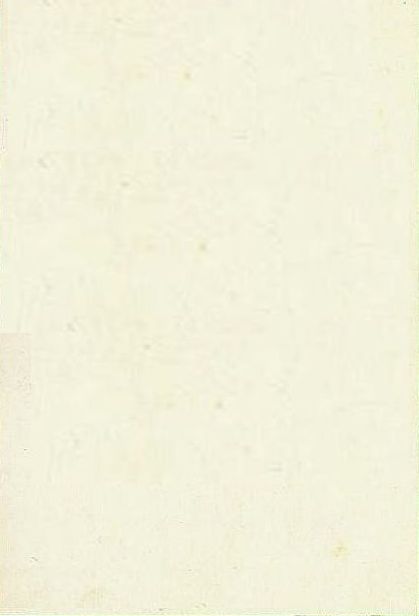
The second poem, "
Parting from thee
", was written almost half a year later, maybe after a furlough. For here, differently from the first poem, the pain of parting lingers on, but in a much more enduring way the strength expands which the author gathers from the bonds with his wife, even over the massively growing distance.
The first of these four poems, the third one overall, remains in the plural altogether, there is the "we" and the plural-"you" ("ihr" in German), no "me", no "thou" ("du" in German), starting with the poem's heading: "
All roads lead to you
". In this case the "you", though rather diffuse altogether, shows some maternal features, at least; in the middle of the cold, bleak, life-hostile world of war which is depicted first, then without transition, almost like a strong hallucination a dream world of a happy childhood unfolds which eventually is linked with the present reality by declaring the utopian "you" from that dream world the target of all striving, of all paths ahead.
The fourth poem, "
Russian billet
", ist the first one which does not turn to an addressee (no "thou" or "you" except for echoing direct speech of the two persons mentioned in the text). As a speaking subject a "we" appears which represents a variant of a first- person narrator who - though being one of the acting persons of the poem's story - keeps a certain distance and objectivity, as well, allowing him to tell the story of that night in a laconic, almost minimalist language which paradoxically contributes to the poignancy with which the message of the poem is conveyed, an ambiguous message in which the target of craving, the expected consolation is drowned out by the bleak reality.
Less ambiguously, but still full of riddles - embedded in an allegory -, in the sixth poem, "
St.George
", the author takes on the demands of war, the inescapability of subordination under its laws in that forced struggle for existence against the threats which surrounded the forcibly recruited from all sides. But also here, eventually a fortunate twist happens: the warrior shows humility, and God, who in this poem is the addressee of the poet, becomes the highest, the last instance instead of the initial master, the war.
Entirely this-worldly, present, real, almost political and critical the seventh poem: "
On the Dnieper
". It does completely without rhyme and constant meter and, nevertheless, as a small piece of high art it represents a very special treasure. Here - what was not a matter of course nor without risk in those times of the ideology of a master race - Kurt Müller commits himself to humanity, not only to his own one, but also to the humanity of the native "subhuman" people, of the oppressed and disenfranchised. The tripartite poem begins with a prospect that appears almost unreal in which the beauty of nature and buildings blends in the view of destruction. Then, in the second part, people enter the scene, suffering, mirroring the destructions, but also carrying sprouts of hope. Eventually, though, in the last part, hope and consolation, unlike in most of the other poems, are destroyed in the bud, again. Destroyed by the appearance of the "God of the time" who is no god at all but a faceless warrior, representing the inhumane, soulless, unapproachable and merciless.
The eighth poem forms the greatest imaginable contrast to the seventh: it depicts a wishful imagination of the despairing, the moribund with his frozen hands. Its title already professes to the utopian phantasy: "
And it was but a long journey
". A painting of pure happiness unfolds, scarcely limited by a weak resonance ot the present reality, and supported by a harmonically flowing meter and regular rhymes.
In the ninth poem, a "
Prayer
", which, in its beauty, truth and simplicity, appeals to believers and disbelievers, likewise, written by Kurt Müller on his 38th birthday, he makes even less direct reference to his experiences in the outer reality, but, in timeless words, he expresses a plea referring to the present reality and a deep faith of his own kind, his faith. The consolation he receives from it in a moment of worst hardship is palpable.
The tenth poem, "
The
s
oldier
", and the twelfth, "
The
s
oldier's
w
ife
", form complementary halves of a double-poem, they refer to each other in a loose dialogue, though each of the two poems can stand alone, as well. In each of them there is a fictitious first-person narrator speaking; in the tenth the narrator is - as expected - a soldier, in the twelfth the wife of a soldier, and probably they are meant to be a couple. None of the two narrators, though, can be understood as being a priori identical to the author resp. his wife; even if there is a strong resemblance to real life they are more phantasy than reality. Both poems have one great common theme: love and intimacy in times of separation; distance and yearning turning into closeness; imagination and phantasy dominate the scene, the reality of war does not gain any space here. Nevertheless, the end of the twelfth poem returns to reality, the reality of sacrifice and how to cope with it.
Between these two poems there is the eleventh: "
I have an
a
ngel in me.
" Does the angel connect the two? Is he a separating force, with his otherworldly suggestivity? Or should we regard the sequence of the poems as due just to the dates of their creation, i.e. as something more or less accidental? Anyway this poem, together with a few other poems, stands out of the rest of them, by not directly referring to the cruel everyday experience nor to the need of consolation. The angel makes it all obsolete, maybe. War, though, stays the background, of course, an indirect influence, the driving force of this poem's existential themes of life, death and eternity. In an allegoric as well as mysterious manner, an inner, religious world unfolds which eludes the simple, direct interpretation.
Even more enigmatic and almost uninterruptedly metaphoric the next, thirteenth and last but one poem presents itself: "
Areas of the
h
eart"
. The war, as well, occurs in metaphors, only, what applies to the consoling finale even more, adding something strongly utopian and irreal to it.
In the last poem, the fourteenth, "
A day like yesterday and like tomorrow
" the reality of war, the experience of war return to domination. Consolation is just a short thought, very far, very remote. The expression of monotony, of the lack of prospects, of the loss of control over ones own life ("Only orders") reaches its height in this poem which concludes the series.
These first two poems are the only ones in which Kurt Müller turns to his wife explicitly and consistently. In the other twelve poems, as though the feeling of her immediate presence were dwindling with the war going on and on, he will not turn to her again.
Possibly the next (fifth) poem, "
Russia
", and first and foremost its 2nd part, is one most enigmatic of the 14 poems. Any reasonable interpretation seems to create its own contradictions and riddles. These difficulties and ambiguities stem from the German original and have, purposefully, been kept in the English translation which is rather "congruent" to the German original in this respect. The identity of the plural-you in this poem is somewhat blurred: who is meant? When this "ihr" occurs in other poems, in most of the cases it means familiar souls at home, but here the answer is more difficult.
Not the most obvious interpretation but the most coherent one may be the following. Uncontroversial the start: the longing look towards the western skies is quickly being caught, again, by the apocalyptic reality. The poem's 2nd part, though, and the end in particular, brings confusion: Who is the first "you", who the second? in the most hostile environment, in utter forlornness and chaos there is a last hold for the moribund, if only in a fever. The last "companions", the last "you" are - the roads. They give support, order, orientation, comfort. But it is the comfort of doom, they are highways to hell, even such as to die for.
And it was but a long journey - 6. May 1942
Prayer - 8. August 1942
The soldier - 2. December 1942
I have an angel in me - 8. December 1942
The soldier's wife - 31. December 1942
Areas of the heart - 17. January 1943
A day like yesterday and tomorrow - 28. January 1943
From thee - 9. July 1941
Parting from thee - December 1941
All roads lead to you - New Year's Eve 1941
Russian billet - 7. January 1942
Russia - 18. January 1942
St. George - January 1942
On the Dnieper - 7. February 1942
Devotion (by Goethe)
The poems:
Below, in the left column, the titles of the poems are listed in the order of the poems' creation. A poem's bilingual page is opened by clicking on the poem's title. The right column contains short descriptions of the poems. To read them you can either scroll this column up and down manually or move the cursor over the title of a poem (left column) to make the description of this poem appear in the visible window (right column).
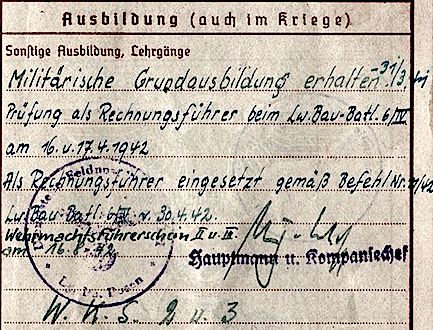
Trainings / qualifications 1940 to 1942:

Below: Excerpts from Kurt Müller's "Wehrpass" (service book)
for the time in Russia 1941 to 1943:
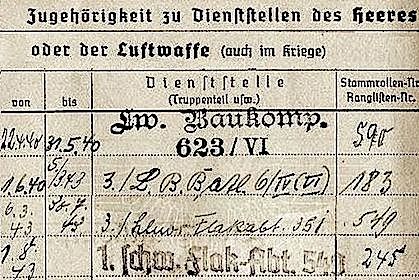
Units which Kurt Müller sen. belonged to between 1940 and August 1943:
22.4.40 31.5.40 Air F. Build.Comp. 
 59
59



 623 / Vi
623 / Vi
1.6.40 5.3.43
3.A.F.Batl. 6/IV(VI) 
 183
183
6.3.43 30.7.43 6.heavy Anti-aircr.div. 351  549
549
1.8.43 
 1.heavy Anti-aircr.div. 549
1.heavy Anti-aircr.div. 549  245
245

For the entire time in Russia he was deployed in the 3rd "Luftwaffen-Bau-Bataillon" (Air force construction batallion) of the 6. Army and the IV. resp. VI. army corps. The batallion 62./VI was created in early 1940 with 3 companies. In 1941 it was renamed "
Luftwaffen-Bau- Bataillon 6/IV
" and had 4 companies.
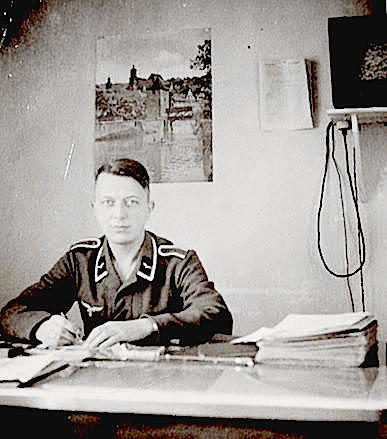
Above and below: Kurt Müller was the
accountant of his company (May 1942 - 1945).

Poems in the war 1941 - 1943
For Kurt Müller the war in France took about two months after which he belonged to the ground staff of air fields in France for about a year, without any fighting, before he was deployed in Germany for one more month. He was not prepared, at all, for what was to come when the order for the invasion of Russia reached his company. In the coming months, the deeper he was thrown into a pitiless world of war and the more cruelly the extremely bad winter equipment and clothing of the German soldiers took its toll, the more intensively Kurt Müller experienced an increasingly oppressing, partly nightmarish change of his world of experiences. To cope with these overwhelming experiences he began to write poems, again. These poems bear witness to the general pressure of war: the experience of life danger and the struggle for survival, of everyday deaths, destruction and suffering, they bear witness to the pressure of the very special conditions of life in the Russian winter and to the pressure of a cruel and permanently threatening dictatorial regime, even if slightly softened by the buffer provided by his quite special batallion (we do not know, though, to which extent - or if at all - specific experience or information of the crimes against the Jews and other Nazi victims, committed in the war-torn east, contributed to this overall pressure, as well; see "
Military and historical context
" further down on this page.
The soldiers and officers of his construction batallion may not have been heroes or resistance fighters but were, predominantly, no Nazis, either. The majority of these men were neither really predestined nor considered qualified to be crime helpers because they were explicitly selected as particularly unreliable and untrustworthy by the Nazis, as the remarks of sergeant Buss reflect (see above under "Background of the poems' creation").
What we do not know, though, is which Information or rumours about the beginning crimes against the Jews reached Kurt Müller during those months and might have contributed to the background of experiences influencing their creation. The long talk with Kurt Müller about his life experiences,
documented
(in German) on these internet pages, having taken place in 1982, followed a chronological order and ended, unfortunately, with his war memories just only starting to be depicted. It could never be continued because of his dramatically worsening health condition. He died few weeks after the second interview. Before this, there had been talks in the family about the 3rd Reich and the crimes against the Jews (in particular since three of Kurt Müller's best friends had been murdered), but the experiences and informations he collected as a soldier had not been discussed explicitly.
* His values are reflected in the words of his Jewish friend
Grete Wolf
, to whom he was connected in friendship all his life long. After his death, she exchanged several letters with his son and described what their friendship had been like and how it was maintained even under Nazi rule and its dangerous conditions for such a connection:
"He maintained his friendship, in spite of the horrible times & he as well as his mother did not refrain from staying in connection with us, so close were the two families to each other...... She & your father remained faithful to us in spite of Hitler. ....that was real friendship which you scarcely find here
[shortly before the war she escaped to the US]
. For better or for worse we hung together.

In the poems there is no clear or immediate reflection of the crimes against the Jews (what would have been unlikely, though, anyway because mentioning them in an any detectable form could have been very dangerous then). Compassion, a feeling for the suffering people, soldiers and non-soldiers, can be found in many a passage of the poems, very cearly, for instance, in the poem "
On the Dnieper
".
* His values are reflected in the words of his Jewish friend
Grete Wolf
, to whom he was connected in friendship all his life long. After his death, she exchanged several letters with his son and described what their friendship had been like and how it was maintained even under Nazi rule and its dangerous conditions for such a connection:
"He maintained his friendship, in spite of the horrible times & he as well as his mother did not refrain from staying in connection with us, so close were the two families to each other...... She & your father remained faithful to us in spite of Hitler. ....that was real friendship which you scarcely find here
[shortly before the war she escaped to the US]
. For better or for worse we hung together."
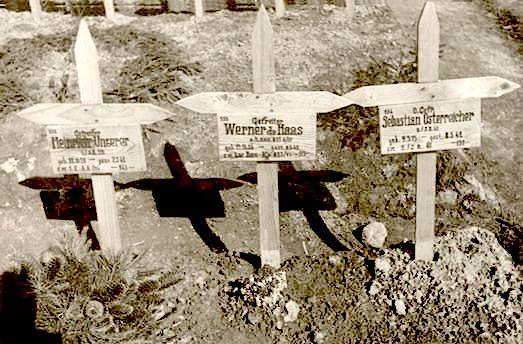

The creation of the poems began in the first days of the invasion of the Soviet Union which came as unexpected for Kurt Müller as for anyone else at that moment. Before, as far as dangers and afflictions for him personally were concerned, the war had shown a comparatively mild face. Before the war without any personal experience of military service, he was not conscripted for the war against Poland, and when this happened in 1940, after all, he went through a short training and then, for the war in France, he was lucky enough to become part of a company which was not drawn into severe fighting and consisted of men who kept some mental distance to the Nazi regime. It was, as he describes it,
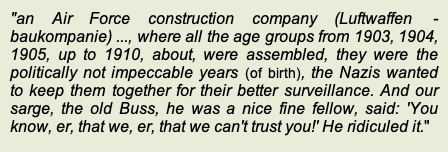
This series of poems reflects feelings and impressions of Kurt Müller during the war in Russia. Their overall guiding theme is the author's anxiety and struggle to preserve or restore his inner self and to find a support he can hold on to in the forlornness of war. He strives for this support in the invocation of the bonding with the familiar, first of all with his wife to whom the poems are sent, but also with his entire family, his world at home, his friends, the life he had to abandon. He finds support in his memories of his wife, his home, in his Christian belief, in his never ending longing and remembering, interwoven with reflections of his war experiences in a tense balance. While he is clinging to support, the contrasting, harsh outer world intrudes again and again, the real world of war.
>> next >>
<< back <<
© Kurt Müller 2016




Homepage auf
Deutsch
Deutsch




Homepage in
English
English
Homepage
Kurt Müller sen.
Kurt Müller sen.

Background of the poems' creation:
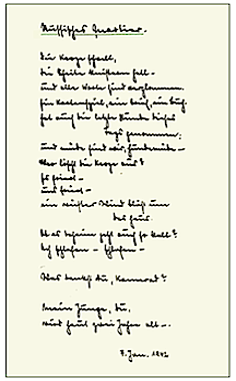

The poems were translated by
Kurt Müller
(jun.)
, the poet's son, provided with a native speaker's advice by his wife
Anne Humphreys
.
Also
Jacqui Humphreys
contributed significantly to the final shape of the translations with various inventive new solutions and with hints which led to important corrections.

Ranks 1941 to 1943:

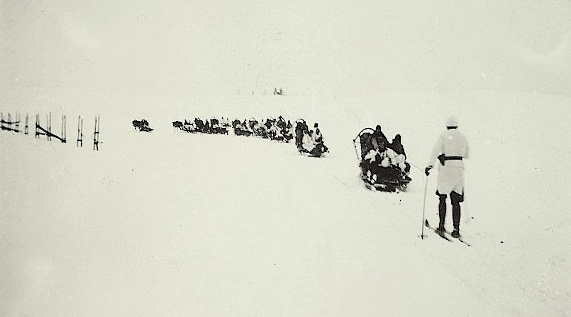
Military and historical context
Then, in 1941, Parafianovo / Парафьяново / Paraf'yanov (width/length: 55°/28°), the place where the first of the 14 poems was created, was a "Schtetl", a little town with a predominantly Jewish population (about 150 families). It is located on an important railway line, half way between Vilnius and Vitebsk, and belongs to Belarus today. Between the wars it was part of eastern Poland which according to the Molotov-Ribbentrop Pact was a "sphere of influence" of the Soviet Union and annected by Stalin in 1939. After Nazi Germany invaded the Soviet Union on 22.6.1941 this area was
occupied
by the Wehrmacht. Kurt Müller, being part of an Airforce Construction Batallion (see above), was probably deployed at the "
Fliegerhorst Paraf
i
ano
v
o
" (airbase Parafianovo) from 9.7. to 1.8.1941.
Then the batallion advanced to
Orsha
(
Орша
, now Belarus). 130 miles further east. There Kurt Müller, on the airfields of
Orsha
and
Orsha- South
, Kurt Müller was deployed until the 5th March 1943 when his time in Russia ended. The air field of Parafianovo, though, was used only for 3 weeks. Units of the bomber wings ("Kampfgeschwader") 2 and 3, "Holzhammer" and "Blitz", operated exactly from 9.7. (and 10.7.) until 1.8. from Parafianovo. In this time the forwardmost eastern front crossed the Dnieper, and the cauldron
battle of Smolensk
started.
In these first weeks of the war in Russia, when Kurt Müller wrote the first of the poems, he did not know that, very soon after the air force and its building batallions would have left, in the area of Parafianovo the systematic mass murder of the Jewish population would be started. He knew, having witnessed the fate of friends, about the persecution of the Jews, he knew about crimes committed by the Nazi state and about concentration camps. Nevertheless, like most people, not least the victims themselves, he did neither foresee nor expect the impending organised mass murder. He couldn't, but it would also have gone beyond his imagination and contradicted his personal values* entirely.
We do not know how closely he was eventually approached by the criminal events and actions, committed predominantly by the so-called "Einsatzgruppen" (special task forces) of the SS, to a smaller extent also by other units (parts of certain infantry and police regiments). We know, though, that he was spared the worst possible decision conflicts such a deployment would have meant because the air force building batallions, like the large majority of the millions of German troops deployed in this part of eastern Europe, did never participate in these crimes. Having been spared these horrible choices is certainly not Kurt Müller's personal merit but owed to the fact that he was part of a social group which was considered politically unreliable and potentially anti-Nazi, and which also seems to have justified this assumption, indeed. The memory of Kurt Müller (see above) reflecting his first encounter with his sergeant corresponds to this fact als well as the following experience from the very first day of the invasion of the Soviet Union anecdotically illustrates how the men of this batallion agreed in a mental distance from what Nazi propaganda tried to implement but also in their fear of the deadly dangers the dictatorial regime provided for the "undermining of military morale“:
In German, their original language, Kurt Müller's war poems have been on display for several years here on this site. But since this is a bilingual site, the challenge proved ever more tempting to provide some access to them for our English - non-German - speaking visitors as well. Now the work is done and the translations are on display. Each of them has its own page where it can be beheld side by side with its German language counterpart or also with the facsimile of the handwritten, truely original version.
It was, though, not only a tempting, but an ambitious challenge, of course. Translating poetry, compared to translating prose, is a very different task, maybe more demanding, certainly more time-consuming. The meaning of a poem is transported, yes, even defined differently, compared to prose. It is generated simultaneously by a multitude of factors. Its carriers are not only denotation and a bit of connotation (like of prose, often), but also many other text features contributing to the reader's, or - better - the hearer's impression of the content and his feelings about it. Such additonal parameters are, in particular, meter, rhythm, rhyme and other structural features of the text (alliterations, for instance); it is their interaction, more than the single parameters as such, which modifies the meaning. Meter, for instance, as such does not usually carry an abundance of meaning (though some, nonetheless), but how and where it is interrupted, for instance, can as strongly contribute to the total of a stanza's meaning as the way the grammatical structure of a sentence overlaps with the metrical structure and other factors which, for instance, work together to make the rhythm of speech.
Taking all these components into account, it becomes clear that a complete one-to-one transfer of the entirety of a poem's components and structures is impossible; a perfect translation is utopian. It would require a repetition of virtually all these elements coinciding in the same way in the other language as they do in the original one. Even the richest language cannot supply enough variations of construction elements to be able to emulate what was predetermined by another language and its different structures and elements.
So if we might easily accept the unattainability of perfection when translating prose, with the translation of poetry it means an unavoidable incompleteness which is hard to accept and can cast doubt on the sensibility of the whole intention. We can't but just approach a complete transfer of the poem's meaning, never reach it, and sometimes the quality of the result may justify the attempt, sometimes it won't. With so narrow the path to an acceptable result translators won't easily agree about which elements contribute more to the overall meaning, in the single poem as well as in principle. It will depend on personal preferences whether, for instance, a literal translation of the text will be chosen at the cost of structural elements. Arbitrary decisions*, like this one, are similarly unavoidable as incompleteness, indeed.
When translating Kurt Müller's war poems, as on display here, we have tried to incorporate all major contributors of meaning to as great an extent as possible, but when decisions between different carriers of meaning become unavoidable, we gave strict priority to the preservation of the major formal poetical structures at the expense of the preservation of a literal denotative translation, for instance of the exact metaphor which then was replaced by a different metaphor, with the same basic contribution or tertium comparationis, though. So preserving the complete, sometimes complicated rhyme structure in the target language, English, was given almost absolute priority, be it regular like in the first poem, be it irregular, complicated, covered by the contrarious sentence and meter, and then surprising like in the second, "
Parting from thee
". The strength of a rhyme, though, sometimes was a field of compromises; strong rhymes were not always preserved in the target language but sometimes translated by weak rhymes, as the price for thus staying closer to the original in other respects. If to a lesser extent than the rhyme structure, also the metric structure including its irregularities was the object of prioritised preservation, and, similarly, the rhythm of speech. But also other factors, closer to a poem's content, were given a weight as high as possible: the "colour" of a sentence, for instance, the way of speaking, the basic feeling of the speaker as well as the basic, deeper meaning of a sentence even if the single metaphor may have to be replaced by a similar one if the target language does not offer a rhyming equivalent.
A specific difficulty when translating from German to English concerns the personal pronoun. The German language makes a distinction between the second person singular and the second person plural, it has different words for the two numbers: "du" (singular) and "ihr" (plural) whereas the English language nowadays uses what once was the plural, "you", for both numbers, plural and singular. What used to be the singular, "thou", is restricted to certain areas of use now (biblical context, certain dialects, but also poetic context). For the translation of Kurt Müller's poems this situation causes the difficulty that, if the singular "du" as well as the plural "ihr" is translated by the ambiguous "you", then in many cases, indeed, the reader cannot tell the difference, i.e. it is not possible to tell which number is meant though in the original there is no doubt which number, ie. which person(s) is/are meant. Within small units of speech like poems this deficit of translation cannot be compensated as easily as in prose text.. This is one of the reasons why for the translation of the personal pronoun we** make use of our "poetic license" (maybe not only the poets themselves, but also the translators of poetry are granted this license, as well), take the liberty and, for the sake of unambiguity of translation as one of the reasons, use the poetic "thou" for the most cases of "du": when the author addresses his wife ("
From thee
", "
Parting from thee
", "
Russia
") or when he addresses God ("
St.George
", "
Prayer
"); it is not used, though, when a fictive person addresses another fictive person (like in "
The soldier
" and "
The Soldier's Wife
").
Last but not least, the key task of any translation, in the case of poetry an extremely sensitive task, must be looked at, as well: selecting the words or expressions able to resurrect the originals content in the target language. A perfect transfer may not work in many cases but aiming for the best version and at least for a sufficiently fitting one is the core task of translation. As trivial this may sound in principle, as tricky it is in practice, particularly in those exceedingly difficult cases when additional advice is required from a native speaker of the other language (if, as usual, the translator is a native speaker of one of the two). Normally this proves a great help as we could experience.
In certain cases, though, which often are not easily recognized as such, this effort stays insufficient. In such a case, superficially all requirements seem fulfilled, in particular the accordance with translations offered by dictionaries. But originals with a very special mixture of unusual denotative and connotative meanings, not covered by a dictionary's offers, but only defined by the context in a poem, can produce the dodgy situation of a principle gap of understanding on both sides of the language barrier opening widely. How can in such a case the content of the original validly and reliably be communicated to the advising speaker of the target language, without an existing valid translation so far? There are ways, in general, but in difficult cases they may fail and wrong-positive answers (unfitting suggestions) or wrong-negative ones (false rejections of fitting suggestions) appear. The same mistakes can vice versa occur to the speaker of the original language, of course, in both cases because of a natural, unavoidable bigger or smaller lack of experience in the other language.
An example for this kind of difficulty is the translation of the German word "Höhlen" (as part of a description of a face) in the poem: "
On the Dnieper
" which for some reason was the most controversial single translation problem. For part of the translators, of all possible translations the English word "hollows", though in general its range of meanings as a noun is not centered around the equivalent of "Höhlen", nevertheless seemed to come closest to the meaning of "Höhlen" in this case. In the following thorough discussion three - eventually associated - questions dominated which initially were differently answered by different native speakers of English:
1. Is this a correct translation, at all, or does "hollows" not cover the required meaning at all? 2. If it is correct as such is it valid without any additional specification (like, in the examples below, "in the cheeks" etc.), and with the further context as the only help to select the intended meaning from the rather wide choice of possible meanings?
3. Should, if a perfect translation is impossible, an approach be chosen which, compared to the original, is more explicit and interpreting (i.e. "gaunt face" instead of "hollows", for instance) rather than more vague?
To answer these questions looking at examples by English authors of fiction and non- fiction as well as examples quoted in English dictionaries proved a useful method. As far as the first question is concerned examples show that the use of "hollows" in the specific sense meant in the poem is common, if with the explicit addition of explaining expressions. Examples for "hollows" with the additions "in the cheeks", "in the face" and "under the eyes" are frequent, and not only in a technical, for instance medical sense ("
the hollows in the face help to amplify the sound of the voice
"), but also in other contexts which come very close to the context in the poem: "
On the Dnieper
".
One such example is by Ben Shepard from "A War of Nerves: Soldiers and Psychiatrists in the Twentieth Century": "Their pallor, the hollows in their cheeks and beneath their eyes, and the utter fatigue … are eloquent of the exhaustion and frustration which they feel".
So, even if the connotative profile may not always perfectly fit the context of the poem, this seems to be a basically correct translation.
But would it still be correct without an explicit explaining addition? The decisive point in this respect is that also in the German original a gap exists between the main or average use of the word "Höhlen" ruling the first associations released by its perception on the one hand and the meaning - or, since its poetry, a complex of meanings - valid in this specific case on the other hand. The transformation of perception, leading from the first, at least incomplete associations to the shaping of a case-specific meaning, is achieved not by explicit specifications like in Shepards sentence but, much more indirectly, through the demands set up by the wider context. This given, it would be wrong or at least unfair to expect anything different from the English translation. The possibly misleading character of the first assciations released by the word "hollows" is a correspondent of what equally happens during the perception of the German original.
The third question, to which extent interpreting elements should be added by the translation, is in a way the most difficult one because there is no method to determine a true or correct answer. It is, though, also the easiest one because it is a matter of the translator's personal approach and of his decision which choice might just be the lesser evil.
Translating poetry
All this was considered and kept contributing to the new creation of a poem's English version - because it can't be anything other than that: a piece of living language of its own, working independently to let an impression emerge in the English reader's - or hearer's - mind which eventually should be as close as possible to the impression created in the German reader's mind before. We hope not to have failed this target by too wide a margin, but we know that there is still a lot of room for improvement .
* An example is shown here of two very different translations of one and the same poem, Heinrich Heine's "Enfant perdu" (with the German original being reproduced as written as well as audible text, in the latter case recited by Kurt Müller). The translations which both have their strong and their less strong passages were done by Lord Houghton and Louis Untermeyer.
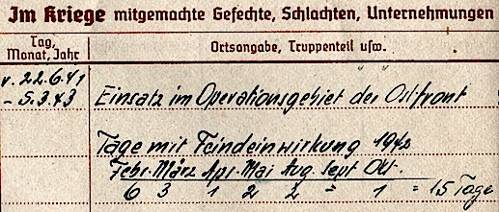
"Deployment" in Russia:


Left:
the number of Kurt Müller's identification tag.
"623" means that he belonged to the
third company of the batallion.


Menü



